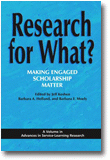
Research for What?
Making Engaged Scholarship Matter
Edited by:
Jeff Keshen, University of Ottawa
Barbara E. Moely, Tulane University, New Orleans
Barbara A. Holland, Service-Learning Clearing House
A volume in the series: Advances in Service-Learning Research. Editor(s): Alan S. Tinkler, Missouri State University. Todd A. Price, National Louis University.
Published 2010
Research on service-learning and community engagement has exploded over the past decade. It is a field now characterized by increasing methodological and theoretical sophistication, vast quantitative and qualitative studies, interdisciplinary research, myriad subjects, and the internationalization of scholarship.
The papers in this volume were selected from nearly 100 presentations made at the 2009 annual conference of the International Association for Research on Service Learning and Community Engagement held in Ottawa, Canada’s national capital. The conference theme, Research for What? emphasized fundamental questions, namely: to what extent is rigorous research uncovering best practices in, and demonstrating the positive results of, service-learning on teaching, learning and building better communities? The papers examine such themes through lenses that include the application of theory to practice, K-12 and university-based service-learning, interdisciplinary initiatives, and international service-learning. The introduction provides an overview of the very recent, but remarkable, growth of service-learning in Canada, and the conclusion, written by the recipient of the Association’s annual Distinguished Researcher Award, discusses major developments, and continuing challenges, in service-learning research.
CONTENTS
Acknowledgments. Introduction, Jeff Keshen, Barbara A. Holland, and Barbara E. Moely. PART I: THEORY AND METHODOLOGY. Toward Understanding Reciprocity in Community- University Partnerships: An Analysis of Select Theories of Power, Lorilee R. Sandmann, Brandon Kliewer, Jihyun Kim, and Anthony Omerikwa. Quantitative Assessment of Service-Learning Outcomes: Is Self-Reported Change a Reasonable Proxy for Longitudinal Change? Nicolas A. Bowman and Jay Brandenberger. PART II: SERVICE-LEARNING IN THE K-12 SETTING. Facilitating Transformation Through Education: Promoting Teaching of Social Responsibility and Civic Education for Democracy, Janel Smith and Annie McKitrick. Conceptual and Analytic Development of a Civic Engagement Scale for Preadolescents, Nicole Nicotera, Inna Altschul, Andrew Schneider-Munoz, and Ben Webman. The Relationship Between the Quality of Service-Learning Interventions and Teen Seatbelt Use, Janet Eyler, L. Richard Bradley, Irwin Goldzweig, David Schlundt, and Paul Juarez. PART III: SERVICE-LEARNING IN HIGHER EDUCATION. Service-Learning and Preinternship Teacher Efficacy: A Comparison of Two Designs, Trae Stewart, Kay W. Allen, and Haiyan Bai. Service-Learning in Singapore: Preparing Teachers for the Future, Robert Schumer and Kim Chuan Goh. Benefits to Students of Service-Learning Through a Food Security Partnership Model, Connie Nelson and Mirella Stroink. PART IV: CONCLUSION. Journey to Service-Learning Research: Agendas, Accomplishments, and Aspirations, Dwight E. Giles, Jr. About the Authors.
-
Paperback978-1-61735-165-5
Web price: $45.04 (Reg. 52.99)
-
Hardcover978-1-61735-166-2
Web price: $80.74 (Reg. 94.99)
- eBook9781617351679

- EDU015000 - EDUCATION: Higher
- EDU037000 - EDUCATION: Research
- SOC035000 - SOCIAL SCIENCE: Volunteer Work
-
 Educating Teachers and Tomorrow’s Students through Service-Learning Pedagogy
Educating Teachers and Tomorrow’s Students through Service-Learning Pedagogy
-
 Pursuit of Liberation
Critical Service-Learning as Capacity Building for Historicized, Humanizing, and Embodied Action
Pursuit of Liberation
Critical Service-Learning as Capacity Building for Historicized, Humanizing, and Embodied Action
-
 Service-Learning Pedagogy
How Does It Measure Up?
Service-Learning Pedagogy
How Does It Measure Up?
-
 Service-Learning to Advance Access & Success
Bridging Institutional and Community Capacity
Service-Learning to Advance Access & Success
Bridging Institutional and Community Capacity
-
 Service‐Learning to Advance Social Justice in a Time of Radical Inequality
Service‐Learning to Advance Social Justice in a Time of Radical Inequality
-
 Taking eService-Learning to the Next Level
Models and Tools for Next Generation Implementation
Taking eService-Learning to the Next Level
Models and Tools for Next Generation Implementation
-
 Transforming Teacher Education through Service-Learning
Transforming Teacher Education through Service-Learning

